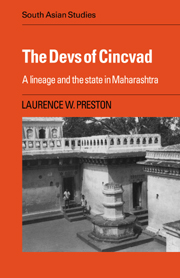Book contents
- Frontmatter
- Contents
- List of figures and tables
- Preface
- List of abbreviations and note on Indian technical usages
- Introduction: an inamdar lineage in Indian history
- PART ONE THE INAMDAR UNDER THE MARATHAS
- PART TWO THE INAMDAR UNDER THE BRITISH
- 3 Introduction to Part Two
- 4 From ritual grandee to state pensioner: varsasans and the Morgav pilgrimage
- 5 An inamdar's domain: Cincvad and the commerce of Pune-Haveli
- 6 The genesis and operation of the Inam Commission
- 7 Claiming an inheritance: the Inam Commission and the Cincvad Samsthan
- 8 Conclusion: an inamdar's rights and the authority of the state
- Bibliography
- Index
- CAMBRIDGE SOUTH ASIAN STUDIES
7 - Claiming an inheritance: the Inam Commission and the Cincvad Samsthan
from PART TWO - THE INAMDAR UNDER THE BRITISH
Published online by Cambridge University Press: 05 November 2011
- Frontmatter
- Contents
- List of figures and tables
- Preface
- List of abbreviations and note on Indian technical usages
- Introduction: an inamdar lineage in Indian history
- PART ONE THE INAMDAR UNDER THE MARATHAS
- PART TWO THE INAMDAR UNDER THE BRITISH
- 3 Introduction to Part Two
- 4 From ritual grandee to state pensioner: varsasans and the Morgav pilgrimage
- 5 An inamdar's domain: Cincvad and the commerce of Pune-Haveli
- 6 The genesis and operation of the Inam Commission
- 7 Claiming an inheritance: the Inam Commission and the Cincvad Samsthan
- 8 Conclusion: an inamdar's rights and the authority of the state
- Bibliography
- Index
- CAMBRIDGE SOUTH ASIAN STUDIES
Summary
Although seeking only to settle title to alienated revenue, the Inam Commission became inextricably involved with the regulation of Hindu inheritance. This was particularly so in three related areas: adoption, the rights of widows, and varieties of inheritance within particular lineages. Adoption was an issue that in the pre-Mutiny period pervaded all British relations with their privileged subjects. Although it was preeminently a problem in the succession to (and lapse to the state of) princely states, adoption also became the central issue in the settlement of the Cincvad Samsthan to be described in this chapter. A consideration of the rights of widows as heirs and managers of inam follows naturally from the issues surrounding adoption. In essence, what part did a widow have in adopting a son, advocating his interests, or acting as his guardian. The critics of the Inam Commission only occasionally considered this aspect of Hindu inheritance; secondary scholarship has paid scant attention to the widow; but here, her anomolous position in Hindu lineages, especially her possible access to real power within the lineage, is a crucial theme. Varieties of inheritance, particularly the distinction between partible and impartible estates, have been examined in the first part of this book in connection with the way the Peshva arranged the descent of the Devs' inam. The quite special features of the Devs' inheritance would bedevil the Inam Commission's efforts to make a straightforward settlement of the lineage's inam.
- Type
- Chapter
- Information
- The Devs of CincvadA Lineage and the State in Maharashtra, pp. 195 - 237Publisher: Cambridge University PressPrint publication year: 1989

